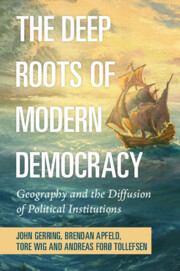
-
Select format
-
- Publisher:
- Cambridge University Press
- Publication date:
- September 2022
- August 2022
- ISBN:
- 9781009115223
- 9781009100373
- 9781009114899
- Dimensions:
- (229 x 152 mm)
- Weight & Pages:
- 0.91kg, 530 Pages
- Dimensions:
- (229 x 152 mm)
- Weight & Pages:
- 0.77kg, 530 Pages
You may already have access via personal or institutional login
Book description
This book explores the deep roots of modern democracy, focusing on geography and long-term patterns of global diffusion. Its geographic argument centers on access to the sea, afforded by natural harbors which enhance the mobility of people, goods, capital, and ideas. The extraordinary connectivity of harbor regions thereby affected economic development, the structure of the military, statebuilding, and openness to the world – and, through these pathways, the development of representative democracy. The authors' second argument focuses on the global diffusion of representative democracy. Beginning around 1500, Europeans started to populate distant places abroad. Where Europeans were numerous they established some form of representative democracy, often with restrictions limiting suffrage to those of European heritage. Where they were in the minority, Europeans were more reticent about popular rule and often actively resisted democratization. Where Europeans were entirely absent, the concept of representative democracy was unfamiliar and its practice undeveloped.
Reviews
‘This book replaces the stereotyped generalizations in comparative politics with something genuinely novel, comparative and historical. A remarkable and exciting innovation.'
James Robinson - The Reverend Dr. Richard L. Pearson Professor of Global Conflict Studies, University of Chicago
‘The authors use a wealth of evidence to build a powerful case that the roots of modern democracy as we know it today lie in a long process involving openness to the outside world as well as the diffusion of ideas and practices. As a part of this harbors-a feature of the natural environment-played a prominent role. This is a must read for anyone interested in the deep history of democracy.'
David Stasavage - Julius Silver Professor, The Wilf Family Department of Politics, New York University
‘… an outstanding book which deserves to be widely read, which will stimulate debate on the origins and spread of representative democracy, and which should find its way into numerous syllabi, ranging from undergraduate to PhD-level courses.'
David M. Willumsen Source: Austrian Journal of Political Science
Contents
Metrics
Altmetric attention score
Full text views
Full text views help Loading metrics...
Loading metrics...
* Views captured on Cambridge Core between #date#. This data will be updated every 24 hours.
Usage data cannot currently be displayed.
Accessibility standard: Unknown
Why this information is here
This section outlines the accessibility features of this content - including support for screen readers, full keyboard navigation and high-contrast display options. This may not be relevant for you.
Accessibility Information
Accessibility compliance for the PDF of this book is currently unknown and may be updated in the future.


